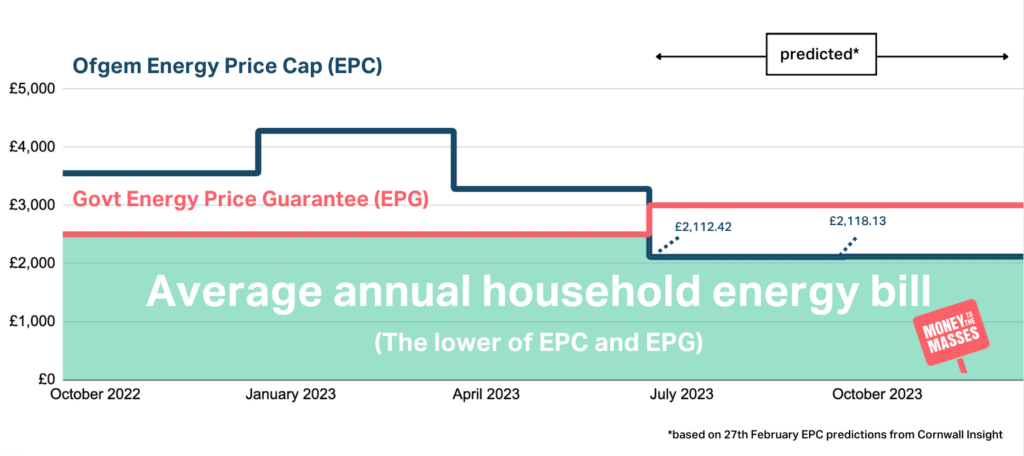Chancellor of Exchequer, Jeremy Hunt, has announced the extension of the government's current £2,500 Energy Price Guarantee (EPG) in today's Spring Budget after it was previously set to increase to £3,000 in April 2023. It was also announced that households on prepayment meters can expect a reduction in energy bill payments to bring charges in line with customers who are currently paying by direct debit. Previously prepayment customers, often those with the lowest incomes, had to pay to cover energy providers' costs of prepayment meter management. The change to prepayment meter charges as set out in the Spring Budget is likely to save prepayment customers an average of £45 on their annual energy bill.
In this article, we explain how the announcements in today's Spring Budget affect your energy bills.
What is the Energy Price Guarantee (EPG)?
The Energy Price Guarantee (EPG) was introduced by the government in October 2022 to help manage the rising cost of living and the stark increase in energy bills. The EPG was lower than the energy regulator's (Ofgem) price cap and therefore capped the average dual fuel household energy bills at £2,500 a year. The Energy Price Guarantee was set to increase to £3,000 from 1st April 2023 but will now remain at its current level of £2,500 until the end of June 2023. Despite the Energy Price Guarantee extension, the government's Energy Bills Support Scheme stops in April meaning that households can still expect a rise in their energy bills.
Although the EPG caps the average domestic dual-fuel household bill, you can pay more or less depending on the actual amount of energy you use. This is because the Energy Price Guarantee actually caps the maximum unit rate that you can be charged for gas and electricity and does not apply to consumption.
Why has the Energy Price Guarantee been extended?
Jeremy Hunt said 'High energy bills are one of the biggest worries for families, which is why we’re maintaining the Energy Price Guarantee at its current level. With energy bills set to fall from July onwards, this temporary change will bridge the gap and ease the pressure on families, while also helping to lower inflation too.'
The extension comes after the Energy Price Guarantee increase was widely criticised by a number of organisations that called for the increase to be postponed.
How does the Energy Price Guarantee extension affect energy bills?
The extension of the £2,500 Energy Price Guarantee means that the unit cost of gas and electricity for the average dual fuel energy bill will not increase for the next 3 months, however, there may be small tariff changes applied by energy suppliers. Households can also still expect an increase in their energy bills as the government's Energy Bills Support Scheme is set to stop. The Energy Bills Support Scheme saw households receive a £400 contribution towards energy bills throughout the winter months, split into monthly instalments of £67. With this set to come to an end at the end of March 2023, customers can therefore expect an increase in their monthly energy bills.
Despite this, as we enter the summer months the need for gas central heating should reduce and with the cost of energy predicted to decrease, households may see a drop in their energy bills. Don't forget that there is also cost of living support available throughout 2023 and into early 2024 for eligible pensioners, those receiving disability benefits and households that received means-tested benefits. More information on the cost of living support available can be found in our Cost of Living guide.
Average annual household energy bill 2023
The below graphic shows how much the average dual-fuel household can expect to pay for their energy bills in 2023. This is illustrated by the green section of the graph, which is the lower amount of the Energy Price Guarantee and Ofgem's Energy Price Cap.
What to do if you're struggling to pay your energy bills
If you are struggling to afford your energy bills you should contact your energy supplier as they are obliged to offer an affordable repayment plan. Additionally, you may be eligible for a grant or scheme to help with your energy bills and your energy supplier can provide information on the various schemes that may be available to you.
You may also be able to save money on your energy bill by cutting down your energy usage. Turning your thermostat down by 1°C could save you up to £115 a year in energy, for example. Additional money-saving tips can be found in our article, 'How to save money on your energy bills'. You may also wish to find out the cheapest ways to cook at home and which appliances cost the most to use.






